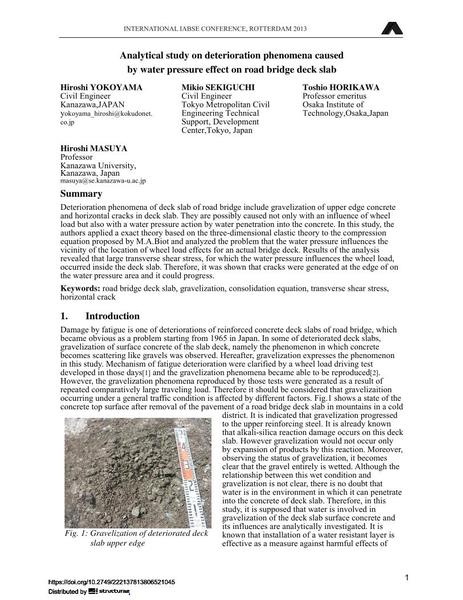Analytical study on deterioration phenomena caused by water pressure effect on road bridge deck slab

|
|
|||||||||||
Bibliographic Details
| Author(s): |
Hiroshi Yokoyama
Mikio Sekiguchi Toshio Horikawa Hiroshi Masuya |
||||
|---|---|---|---|---|---|
| Medium: | conference paper | ||||
| Language(s): | English | ||||
| Conference: | IABSE Conference: Assessment, Upgrading and Refurbishment of Infrastructures, Rotterdam, The Netherlands, 6-8 May 2013 | ||||
| Published in: | IABSE Conference, Rotterdam, May 2013 | ||||
|
|||||
| Page(s): | 458-459 | ||||
| Total no. of pages: | 8 | ||||
| Year: | 2013 | ||||
| DOI: | 10.2749/222137813806521045 | ||||
| Abstract: |
Deterioration phenomena of deck slab of road bridge include gravelization of upper edge concrete and horizontal cracks in deck slab. They are possibly caused not only with an influence of wheel load but also with a water pressure action by water penetration into the concrete. In this study, the authors applied a exact theory based on the three-dimensional elastic theory to the compression equation proposed by M.A.Biot and analyzed the problem that the water pressure influences the vicinity of the location of wheel load effects for an actual bridge deck. Results of the analysis revealed that large transverse shear stress, for which the water pressure influences the wheel load, occurred inside the deck slab. Therefore, it was shown that cracks were generated at the edge of on the water pressure area and it could progress. |
||||
| Keywords: |
horizontal crack road bridge deck slab gravelization consolidation equation transverse shear stress
|
||||
